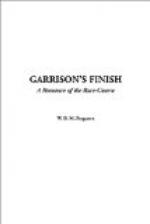The Deshas, like all true Southerners, believed that love was the only excuse for marriage; just as most Northerners believe that labor is the only excuse for living. And so the colonel, with no business incentive, acumen, or adaptability, and with the inherited handicap of a luxurious living standard, made a brave onslaught on his patrimony.
What the original estate was, or to what extent the colonel had encroached upon it, Sue never rightly knew. She had been brought up in the old faith that a Southerner is lord of the soil, but as she developed, the fact was forced home upon her that her father was not materialistic, and that ways and means were.
Twice yearly their Kentucky estate yielded an income. As soon as she understood affairs, Sue took a stand which could not be shaken, even if the easy-going mooning colonel had exerted himself to that extent. She insisted upon using one-half the yearly income for household expenses; the other the colonel could fritter away as he chose upon his racing-stable and his secondary hobby—an utterly absurd stamp collection.
Only each household knows how it meets the necessity of living. It is generally the mother and daughter, if there be one, who comprise the inner finance committee. Men are only Napoleons of finance when the market is strong and steady. When it becomes panicky and fluctuates and resolves itself into small unheroic deals, woman gets the job. For the world is principally a place where men work for the pleasures and woman has to cringe for the scraps. It may seem unchivalrous, but true nevertheless.
Only Sue knew how she compelled one dollar to bravely do the duty of two. Appearances are never so deceitful as in the household where want is apparently scorned. Sue was of the breed who, if necessary, could raise absolute pauperism to the peerage. And if ever a month came in which she would lie awake nights, developing the further elasticity of currency, certainly her neighbors knew aught of it, and her father least of all.
The colonel recommenced his pacing. Sue, hands clasped around knees, watched him with steady, unwinking eyes.
“It’s not the deviled crab, daddy,” she said quietly, at length. “It’s something else. ’Fess up. You’re in trouble. I feel it. Sit down there and let me go halves on it. Sit down.”
Colonel Desha vaguely passed a hand through his hair, then, mechanically yielding to the superior strength and self-control of his daughter, eased himself into an opposite armchair.
“Oh, no, you’re quite wrong, quite wrong,” he reiterated absently. “I’m only tired. Only tired, girlie. That’s all. Been very busy, you know.” And he ran on feverishly, talking about Waterbury, weights, jockeys, mounts—all the jargon of the turf. The dam of his mind had given way, and a flood of thoughts, hopes, fears came rioting forth unchecked, unthinkingly.
His eyes were vacant, a frown dividing his white brows, the thin hand on the table closing and relaxing. He was not talking to his daughter, but to his conscience. It was the old threadbare, tattered tale—spawn of the Goddess fortune; a thing of misbegotten hopes and desires.




